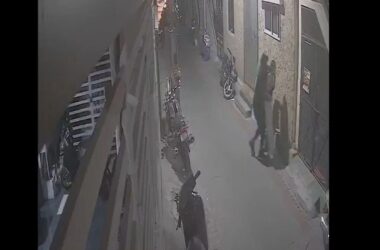[ad_1]
“I’ve often found that the way people see me is very different from how I see myself,” Nicholas Galitzine said. “People attribute a pristineness to me.”
This was on a recent morning in a rococo hotel room, just west of Madison Square Park. (How rococo? Imagine Fragonard macrodosing on psilocybin.) Galitzine, who recently relocated from London to Los Angeles, was in New York for a few days to promote “Mary & George,” a steamy historical drama in which he stars as George Villiers, the ambitious lover of King James I. It premieres Friday on Starz. Next month, he will also appear as Hayes, a boy-band sensation in an age-gap romance, in the giddy Amazon rom-com “The Idea of You.”
Boyishly handsome, with lips like plumped throw pillows and a jawline that is frankly ridiculous, Galitzine, 29, is often cast as princes (“Cinderella,” “Red, White & Royal Blue”), straight and gay, or as modern-day prince equivalents — a pop phenom, a football star. That’s how Hollywood has seen him: patrician, elegant.
“Refined, maybe, is a word,” he said. (That upmarket English accent? It helps.) But refined is not an adjective he applies. He described himself instead as “chaotic,” as “messy,” which princes aren’t always allowed to be.
“That’s a tricky thing sometimes, playing princes and people expecting that,” he said. “The reality is very different.”
Is it? It’s a given that emerging actors tend to be on their best behavior around a reporter, but even so, Galitzine was never anything less than gracious. And his grooming was impeccable. Pristine, you might say. He wore a rugby shirt — he once planned on a career as a rugby player — with decorative cutouts and one ear held a small hoop. That earring looked like a homage to his “Mary & George” character, but he has had the piercing since he was 12.
In person, Galitzine is sweet, self-effacing, reasonably confiding. He stands six feet tall, but in some ways he is still growing. As an actor, he is only now outstripping the limits of his debonair onscreen identity and looking for what’s beyond them.
“People really just want to see you play the same thing until you can show them something else,” he said. He knows that he has a talent for romance, which explains most of his previous and current roles. “If I had to be self-aggrandizing for a moment, a thing I do well is create a sense of chemistry,” he said. And it’s true. He has had chemistry with every actor and actress he has played opposite. Probably he could have chemistry with the sidewalk.
He was out of the hotel now and on the perimeter of the park, gently deflecting the glances of the fans who recognized him. They may have been disappointed to hear him say that he is done playing princes. “I’m stepping away from romantic leads,” he said.
For most of his life, Galitzine never thought he’d be stepping toward them. The son of a Greek mother and an English father, he grew up mostly in London. During holidays on the Greek islands, his older sister used to rope him into putting on plays, but at his all-boys’ school, he pursued athletics — soccer and track along with the rugby. On the field, he had a place to put what he referred to as his “chaotic A.D.H.D. energy.” (He was diagnosed with attention deficit hyperactivity disorder as a child.)
Those sports led to many injuries: concussions, hamstring strains, rotator cuff issues. “I was just losing complete faith in the reliability of my body,” he said. He was also losing faith in the macho culture of athletics.
“I was coming into my own as a sensitive young man, and I was jarring up against these archaic ideals,” he said.
Leaving sports created a vacuum that academics couldn’t fill. His parents expected him to go to university, but he wasn’t so sure. As he approached graduation, he had vague plans to buy a motorcycle and drive around for a while when a girl he liked suggested that he audition for a play, “Spring Awakening.” That play went to the Edinburgh Festival Fringe, where Galitzine almost immediately attracted the attention of agents. Soon after, he landed a starring role in a movie, “The Beat Beneath My Feet” (2016), a comedy about a sweet-voiced singer-songwriter who blackmails the rock god next door.
Many actors have periods of struggle or dues paying, but Galitzine’s rise was relatively steady. More film roles followed, often romantic ones. He claims bemusement at having been cast so often as pretty boys.
“It’s so funny, because I’ve never felt pretty in my life,” he said. What’s even funnier? He seemed to mean it.
Those roles weren’t necessarily artistically fulfilling, but Galitzine had entered the profession mostly by accident and not necessarily for the art. “Just because you’re good at something doesn’t mean you find purpose in it,” he said.
Yet as he matured, he became more aware of the craft of acting and of the kinds of roles he was and wasn’t being seen for. Cast for his face and biceps, he admitted to occasional professional jealousy and to feeling creatively malnourished. He did what he could with the roles available, which wasn’t always a lot.
“You didn’t sense the implicit darkness I imbued Prince Robert with?” he said of his role in Amazon’s 2021 version of “Cinderella.” “So strange.”
Over the last few years he has begun to feel more agency and his co-stars tend now tend to have an Oscar or two lying around. In “Mary & George,” he stars opposite a scheming Julianne Moore. And if George is another pretty boy, he puts those pretty looks to Machiavellian use. He has always wanted to play dark, he said, but he likes other shades too. “The Idea of You,” in which his melancholy pop star woos Anne Hathaway’s boho single mother, is not exactly gloomy.
“I’m not one of these people who needs to put myself through emotional turmoil in every single role that I do,” he said. But there are moments of murk even in a wish-fulfillment comedy like “The Idea of You,” and the quality in his character, Hayes, that fascinated him the most, he said, was “the claustrophobia of fame.”
So far fame has yet to feel too confining. “The worst I’ve had to deal with is people finding out what hotel I’m staying in and showing up, people shouting my name at me, filming me without my consent,” he said. Still, it isn’t always comfortable. Earlier in March he included a since-deleted post on his Instagram that showed him clasping a female hand, and the internet went a little crazy.
“The online world is a funny old place, and people are very, very curious,” he said.
As an actor, Galitzine is just beginning to reward that curiosity. In many ways he is an entirely typical, if slightly scattered, example of a creative-class male in his late 20s. He is just getting into vinyl. (His taste? “Eclectic.”) He has taken up woodworking and wants to try pottery. He has yet to decorate his new house, and while he has started a production company, he hasn’t gotten around to naming it yet. But in his best work (“Bottoms,” “Mary & George”), there are intimations of depth, of daring, of an antic sense of play.
He’d like to take on more meaningful work, he said, and to explore different genres — westerns, science fiction. He thinks “Mary & George” is already changing how Hollywood sees him, because the roles he is being approached about these days are more layered and demanding than they were in the past.
“I’m being able to hang out with the filmmakers that would not have been intrigued by me before,” he said. “It’s just given me a sense of legitimacy that I never felt I had.”
That’s a sign of his maturity, he believes, though when he talks about it, he still sounds like a princeling.
“There’s just so much more on offer for me now,” he said. “I’m a bit of a kid in the candy store.”
[ad_2]
Source link










